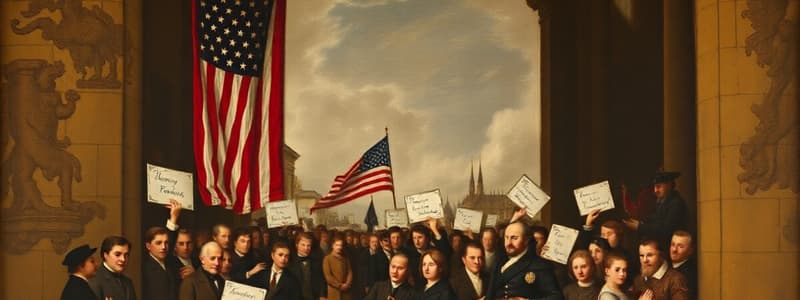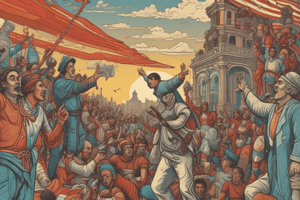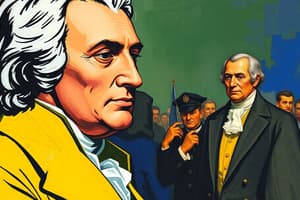Podcast
Questions and Answers
What was the prevailing ideology in government prior to the 1820s?
What was the prevailing ideology in government prior to the 1820s?
- Democracy
- Monarchy
- Anarchy
- Republicanism (correct)
How did politicians in the 1820s and 1830s aim to win the support of ordinary Americans?
How did politicians in the 1820s and 1830s aim to win the support of ordinary Americans?
- By ignoring public opinion
- By engaging in exclusive private meetings
- By rallying supporters through public events and media (correct)
- By avoiding any competitive elections
What did Martin Van Buren assert about governance in a free society?
What did Martin Van Buren assert about governance in a free society?
- Only educated men should participate in politics
- The majority should govern (correct)
- The elite should rule without interference
- Political power should be inherited
What aspect of political life was particularly emphasized by the new breed of politicians in the 1820s?
What aspect of political life was particularly emphasized by the new breed of politicians in the 1820s?
How did the view of government leaders change from earlier periods to the 1820s?
How did the view of government leaders change from earlier periods to the 1820s?
What was a common criticism of Martin Van Buren from republican-minded contemporaries?
What was a common criticism of Martin Van Buren from republican-minded contemporaries?
What role did public gatherings and speeches play in the politics of the 1820s?
What role did public gatherings and speeches play in the politics of the 1820s?
What did the shift to a more democratic system imply about the nature of elections during the 1820s and 1830s?
What did the shift to a more democratic system imply about the nature of elections during the 1820s and 1830s?
Which groups dominated the political system in the new republic?
Which groups dominated the political system in the new republic?
What was the primary argument made by John Jay regarding participation in government?
What was the primary argument made by John Jay regarding participation in government?
How did powerful entrepreneurs and speculators exert influence over local elections?
How did powerful entrepreneurs and speculators exert influence over local elections?
What was the primary goal of the Second Bank of the United States?
What was the primary goal of the Second Bank of the United States?
What was a consequence of the gentry-dominated political system?
What was a consequence of the gentry-dominated political system?
What tactic did speculators use to obtain land grants?
What tactic did speculators use to obtain land grants?
What did Senator Sidney Breese advocate for in relation to Illinois's agricultural products?
What did Senator Sidney Breese advocate for in relation to Illinois's agricultural products?
What principle did Jackson uphold during the tariff crisis?
What principle did Jackson uphold during the tariff crisis?
What did Maryland reformers in the 1810s invoke to expand suffrage?
What did Maryland reformers in the 1810s invoke to expand suffrage?
What large advantage did the Seventh Ward Bank of New York City have in the allocation of shares?
What large advantage did the Seventh Ward Bank of New York City have in the allocation of shares?
Why were creditors pleased with the monetary policy of the Second Bank?
Why were creditors pleased with the monetary policy of the Second Bank?
What was a concern associated with democratic politics during this period?
What was a concern associated with democratic politics during this period?
What was the response of expansion-minded bankers during the Bank War?
What was the response of expansion-minded bankers during the Bank War?
What was the legal tender promised by state-chartered banks for their notes?
What was the legal tender promised by state-chartered banks for their notes?
What concern did ordinary Americans have regarding the Second Bank?
What concern did ordinary Americans have regarding the Second Bank?
What action did Taney take concerning the situation with the Second Bank?
What action did Taney take concerning the situation with the Second Bank?
How did James Parton describe Andrew Jackson's capabilities as a general?
How did James Parton describe Andrew Jackson's capabilities as a general?
What contrasting attributes were used to describe Jackson according to Parton?
What contrasting attributes were used to describe Jackson according to Parton?
Which phrase best captures Philip Hone's view of the Jacksonians’ victory in the 1834 elections?
Which phrase best captures Philip Hone's view of the Jacksonians’ victory in the 1834 elections?
What did Hone imply about the leaders of the Jacksonian party?
What did Hone imply about the leaders of the Jacksonian party?
What does the phrase 'the cry of “Down with the aristocracy!”' suggest about the political climate?
What does the phrase 'the cry of “Down with the aristocracy!”' suggest about the political climate?
How did the citizens of New Orleans participate in Andrew Jackson's campaign?
How did the citizens of New Orleans participate in Andrew Jackson's campaign?
What does Hone mean when he refers to Jackson's vice president's victory as 'mounted on a vicious horse'?
What does Hone mean when he refers to Jackson's vice president's victory as 'mounted on a vicious horse'?
Which term best describes Hone's attitude towards the Jacksonian leaders' approach?
Which term best describes Hone's attitude towards the Jacksonian leaders' approach?
What did the authors imply about the system of protection under General Jackson's leadership?
What did the authors imply about the system of protection under General Jackson's leadership?
In what sense did the authors view Jackson's government as a potential threat?
In what sense did the authors view Jackson's government as a potential threat?
What characterization did Parton give to Andrew Jackson?
What characterization did Parton give to Andrew Jackson?
What effect did the authors suggest Jackson's presidency might have on American liberties?
What effect did the authors suggest Jackson's presidency might have on American liberties?
How did Tocqueville’s perspective differ in his assessment of Jackson?
How did Tocqueville’s perspective differ in his assessment of Jackson?
What was one of the main criticisms related to Jackson's approach to power?
What was one of the main criticisms related to Jackson's approach to power?
What concern did Hone raise about Jackson’s influence?
What concern did Hone raise about Jackson’s influence?
What was the authors’ view on the balance of power during Jackson's presidency?
What was the authors’ view on the balance of power during Jackson's presidency?
Study Notes
The Shift from Republicanism to Democracy
- In the early 1800s, political leaders embraced republicanism, favoring rule by "men of TALENTS and VIRTUE."
- By the 1820s and 1830s, democracy and party politics took center stage as men sought office through campaigning and rallies.
- Martin Van Buren, a key figure in the shift, encouraged ordinary Americans to participate in the political process.
Expansion of Suffrage
- In the early Republic, wealthy notables dominated politics, viewing themselves as the most fit to govern.
- By the 1810s, reformers began advocating for expanded suffrage, influenced by republican ideals of equal rights.
- Between 1818 and 1821, Connecticut, Massachusetts, and New York adopted more democratic constitutions, including apportionment based on population and popular election of judges.
Rise of Democratic Politics
- Democratic politics was contentious and often corrupt, attracting ambitious individuals who sought government favors.
- Entrepreneurs and speculators used bribery and influence to secure land grants and government assistance.
- The rise of party politics led to fierce competition and campaigns that targeted ordinary voters.
The Bank War of 1832
- The Second Bank of the United States, chartered in Philadelphia, played a significant role in stabilizing the nation's money supply.
- The bank's policies, while beneficial to creditors and those invested in economic development, angered many ordinary Americans who feared bank closures and worthless paper notes.
- President Jackson opposed the bank, viewing it as an instrument of the wealthy elite, and vetoed its recharter in 1832.
Jackson’s Legacy and the Rise of the “Democratic Autocrat”
- Jackson's actions in the Bank War, though supported by many, were criticized by some who viewed him as an autocratic figure who trampled on individual rights.
- James Parton, a biographer, described Jackson as a "democratic autocrat," highlighting his forceful leadership style and potential for abuse of power.
- Philip Hone, a contemporary observer, criticized Jacksonian politics for fueling class warfare and fostering a dangerous “mob spirit.”
The Debate: Two Points of View
- Henry Clay, a political rival of Jackson, argued that Jackson's policies favored state interests over the Union, undermining national authority.
- Alexis de Tocqueville, a French observer, analyzed Jackson's presidency and observed the rise of a "democratic autocracy," a government that catered to the will of the majority while potentially stifling individual rights.
Studying That Suits You
Use AI to generate personalized quizzes and flashcards to suit your learning preferences.
Related Documents
Description
This quiz explores the transition from republicanism to democracy in the early 1800s, highlighting key figures such as Martin Van Buren and the expansion of suffrage. It discusses the political dynamics of the era, including the rise of democratic politics and the challenges faced by reformers. Test your knowledge on these pivotal changes in American political history.





